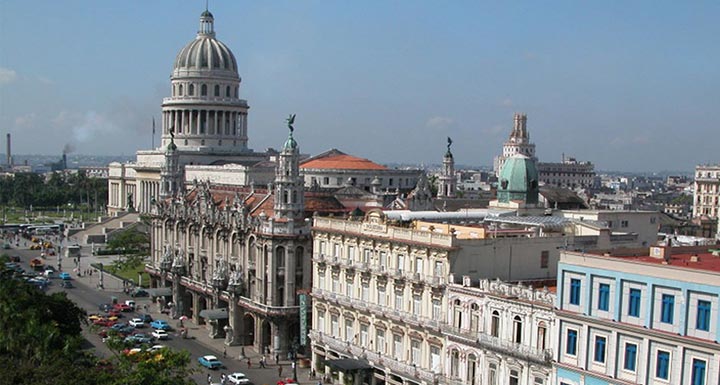
What Cuba can offer
Cuba is the only country in the continent that didn’t raze its magnificent architectural patrimony. What a trivial fever of modernization demolished in the rest of Latin America, Cuba saved, not because it didn’t have the materials to demolish it but because those mansions for one single owner and 100 slaves had become housing solutions for the poor.
Many will say that there was no need to raze that patrimony because it collapsed on its own. I think that what has fallen was toppled by the blockade, and it’s true that in recent times restoration crawled at a tortoise’s pace and decay took hare leaps. But even so, Cuba has saved more beautiful houses than any other country in the continent.
I’ve always thought that Cuba is the perfect site for a Latin American branch of the Guggenheim Museum, which would attract millions of sensitive travelers. Havana has buildings the size of ships that would be ideal for an institution of that kind. Maybe culture can speed up the end of the blockade.
The first thing Cuba should do is to invest on efficient, non-polluting vehicles for public transportation, to save what was won involuntarily: clean air and nonexistent traffic jams. Efficient tram networks and a modern railroad system can protect the island from the violent road congestion that today clogs Latin American cities and correct in that natural paradise the consumerist error of thinking that one automobile per family (or more) is the solution to the needs for transportation.
In the early 1990s, Cuba discovered that tourism can be an important source of revenue when a country has a privileged natural and historical space. But tourism plunders spaces and disturbs customs and Derek Walcott has wisely told us the difference between the tourist, who looks for what’s apparent and exotic, and the true traveler, who not only looks and consumes but also loves and protects the world. Cuba, like our Amazonia, should be a destination for travelers, more so than for tourists.
The fact that Cuba did not experience the most polluting era of industry could allow the island to enter an industrial process with the caution of modernity. It could be a laboratory for how to produce material goods without degrading the environment, without fouling the waters, and without contributing to climate change, which it suffers every time a hurricane makes an obligatory sweep through the island.
Cuba has saved the treasure of neighborly coexistence and has shown what a community of professionals committed to humanity can accomplish. Its literacy brigades have served everywhere and its doctors have done an outstanding job controlling Ebola.
The supportive decision to send medical brigades to Africa was undoubtedly one of the factors that moved Barack Obama to normalize relations. And perhaps only a descendant of Africa could understand that what was at stake in Cuba over the past five decades was not a mere tussle over doctrine but the right of a country to make its own decisions, the dignity of a culture.
When I heard the news that Cuba and the United States were renewing diplomatic relations and that the blockade’s days were numbered, I thought about Gabriel García Márquez. He was Cuba’s best friend. He was capable of appealing to Carlos Salinas de Gortari and César Gaviria to save Cuba from plunging into the chasm. He fashioned a sort of club with the presidents of Mexico, Colombia, Venezuela, Canada, Spain and France to give oxygen to his beloved island.
The flowers that Fidel Castro sent to his funeral were not an official gesture but the voice of a grieving friend, because Gabo’s solidarity was not merely political. In his heart beat “a Caribbean issue.”
I need to repeat that Cuba did not suffer the hell of criminality that throttles other countries’ present and future. The rights to food, housing, health and education are as basic as the right to life, and it’s amazing that in countries that do not guarantee any of those rights to the poor people, many observers rend their clothes over what they call “the human rights situation” in Cuba, where those fundamental rights are guaranteed.
There is much hypocrisy. It was there in the early days, when the Revolution spread enthusiasm and generosity; it was there when Cuba became a strategic enclave of the Cold War, and it was there when hunger besieged the island. But the Cuban Revolution had dug its roots deeply into the conscience and gratitude of its people and that allowed it to survive when other alleged revolutions, such as those in eastern Europe, did not survive.
The regime was odious for those who lived for splendid centuries in one of the pearls of this watery planet, but for innumerable Cubans it meant — for the first time — basic foods, exemplary health care, serious education and a secure roof overhead, something never known by the poor in other countries, who serve as fodder for criminals in the slums of Rio, the hillside shanties of Medellín, the warrens in Mexico City or that no-man’s-land in Mexico’s northern border.
“Who will pay for our model of opulence and injustice?,” a magazine said years ago: “The children of the corn, the born killers, the sweet infancy in flames.”
(From: El Espectador)

